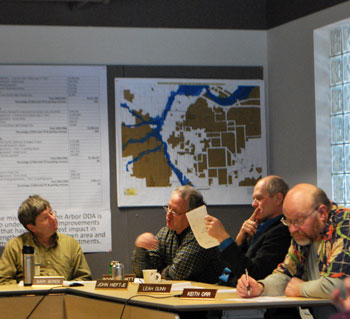DDA OKs Village Green Amendment
Ann Arbor Downtown Development Authority board meeting (Feb. 2, 2011): On a day when other government bodies scrubbed their schedules due to a blizzard forecast, the DDA board held firm to its regular first-Wednesday-of-the-month meeting time. The diminished activity downtown due to the snow led Roger Hewitt to quip during the meeting: “This will not be a particularly profitable day in the parking system, I think we can safely say.” The meeting achieved attendance of 10 out of 12 board members.

From left to right: DDA board members Gary Boren, Roger Hewitt, John Hieftje, and Keith Orr. (Photos by the writer.)
In their one business item, the board approved an amendment to the contract with Village Green to develop a 244-space parking deck as the first two stories of a 9-story, 99-foot-tall building, City Apartments – a 156-unit residential planned unit development (PUD) at First and Washington.
Once the parking deck portion of the building is completed and issued a certificate of occupancy, the city of Ann Arbor has agreed to issue $9 million worth of bonds to purchase the deck, and the DDA has agreed to make the payments on those bonds. The amendment to the contract provides DDA consultants access to the site during construction activities to check that construction methods conform to standards that will ensure a 75-year life for the deck.
On the city council’s agenda for Monday, Feb. 7, 2011 is their own approval of the same amendment to the Village Green contract. The contract amendment is part of a timeline put in place on Aug. 5, 2010, when the city council approved an extension of Village Green’s option to purchase the First and Washington city-owned parcel for $3 million. That timeline calls for Village Green to purchase the land by June 1, 2011.
The $3 million proceeds from the hoped-for Village Green deal were part of the financing plan for the city’s new municipal center, and would have no direct impact on the current general fund’s $2.4 million deficit that’s forecast for the FY 2012 budget. However, during deliberations some DDA board members accepted the point made by their colleague Newcombe Clark – that there are likely indirect connections between the completion of the Village Green transaction and the city’s overall budget picture, at least in terms of cash flow.
In reports and communications entertained by the board, highlights included: (1) a continued interest on the part of the University of Michigan to absorb a segment of Monroe Street into the UM Law School campus; (2) complaints from the property manager at 416 Huron St. about disrepair of an alley and adjoining sidewalks in the area, as well as a lack of maintenance on property owned by the railroad; and (3) an elaboration by the mayor on some remarks about Borders that he’d made and that had been reported in the media. [Full Story]




